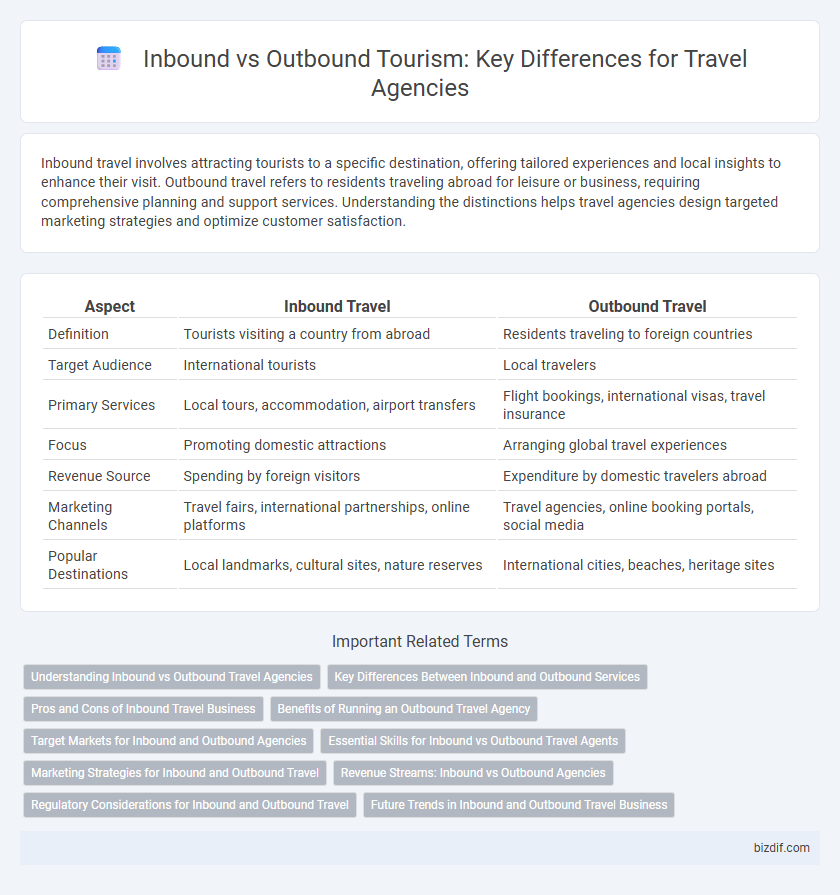Inbound travel involves attracting tourists to a specific destination, offering tailored experiences and local insights to enhance their visit. Outbound travel refers to residents traveling abroad for leisure or business, requiring comprehensive planning and support services. Understanding the distinctions helps travel agencies design targeted marketing strategies and optimize customer satisfaction.
Table of Comparison
| Aspect | Inbound Travel | Outbound Travel |
|---|---|---|
| Definition | Tourists visiting a country from abroad | Residents traveling to foreign countries |
| Target Audience | International tourists | Local travelers |
| Primary Services | Local tours, accommodation, airport transfers | Flight bookings, international visas, travel insurance |
| Focus | Promoting domestic attractions | Arranging global travel experiences |
| Revenue Source | Spending by foreign visitors | Expenditure by domestic travelers abroad |
| Marketing Channels | Travel fairs, international partnerships, online platforms | Travel agencies, online booking portals, social media |
| Popular Destinations | Local landmarks, cultural sites, nature reserves | International cities, beaches, heritage sites |
Understanding Inbound vs Outbound Travel Agencies
Inbound travel agencies specialize in organizing trips for foreign visitors arriving in a specific country or region, offering tailored local experiences and services such as guided tours, accommodations, and transportation. Outbound travel agencies focus on facilitating travel for residents to international destinations, providing expertise in visa processing, flight bookings, and destination-specific arrangements. Understanding the distinction aids travelers in selecting the right agency based on whether they seek local expertise for incoming tourists or assistance for outbound journeys abroad.
Key Differences Between Inbound and Outbound Services
Inbound travel services focus on arranging trips for visitors coming into a country, offering local tours, accommodation, and cultural experiences. Outbound travel services specialize in organizing vacations for clients traveling abroad, including flight bookings, international tours, and travel insurance. Key differences lie in the target clientele, with inbound targeting foreign visitors and outbound catering to residents traveling internationally.
Pros and Cons of Inbound Travel Business
Inbound travel business attracts foreign tourists, boosting local economies through increased spending on accommodation, dining, and cultural experiences. Challenges include the need for multilingual staff, compliance with varied international regulations, and dependency on global travel trends, which can cause revenue fluctuations. Effective inbound travel management enhances local employment and preserves cultural heritage but requires significant investment in infrastructure and marketing.
Benefits of Running an Outbound Travel Agency
Running an outbound travel agency offers direct access to international markets, enabling tailored travel experiences that cater to diverse global destinations. This approach increases revenue potential by tapping into high-demand outbound travel trends and leveraging partnerships with foreign hotels, airlines, and tour operators. Enhanced customer satisfaction arises from personalized itineraries that accommodate travelers' preferences for exploring cultures and attractions abroad.
Target Markets for Inbound and Outbound Agencies
Inbound travel agencies primarily target international tourists seeking destination experiences within their home country, focusing on markets such as the United States, Europe, and Asia to attract visitors. Outbound travel agencies specialize in organizing trips for local residents traveling abroad, with key target markets often including popular destinations like Europe, Southeast Asia, and North America. Understanding the distinct preferences and travel behaviors of these target markets enables agencies to tailor packages and marketing strategies effectively.
Essential Skills for Inbound vs Outbound Travel Agents
Inbound travel agents excel in local destination knowledge, cultural sensitivity, and client communication to manage arrivals and offer personalized experiences within the country. Outbound travel agents require expertise in international travel regulations, visa processes, and global itinerary planning to ensure smooth trips abroad. Both roles demand strong problem-solving skills and adaptability to meet diverse traveler needs and handle unforeseen challenges efficiently.
Marketing Strategies for Inbound and Outbound Travel
Inbound travel marketing strategies leverage local attractions, cultural experiences, and personalized customer journeys to attract international tourists through targeted digital campaigns and influencer partnerships. Outbound travel marketing focuses on creating global brand awareness, utilizing multi-channel advertising, travel expos, and strategic alliances with foreign agencies to inspire domestic travelers to explore international destinations. Both approaches prioritize data analytics, social media engagement, and customized offers to maximize traveler acquisition and retention.
Revenue Streams: Inbound vs Outbound Agencies
Inbound travel agencies generate revenue primarily by catering to tourists visiting a specific destination, earning commissions from local hotels, tour operators, and transportation services. Outbound agencies focus on clients traveling abroad, deriving income through package sales, flight bookings, and international accommodations. Understanding the distinct revenue streams helps agencies optimize marketing strategies and partnerships to maximize profitability in competitive travel markets.
Regulatory Considerations for Inbound and Outbound Travel
Inbound travel regulations often require compliance with visa policies, health and quarantine protocols, and customs restrictions set by the destination country to ensure smooth entry for international visitors. Outbound travel regulations focus on travelers' home country requirements, such as passport validity, exit permits, and mandatory travel insurance, along with adherence to foreign entry rules to avoid legal issues abroad. Both inbound and outbound travel involve dynamic regulatory frameworks influenced by geopolitical factors, health crises, and bilateral agreements, which travel agencies must continuously monitor to provide accurate guidance.
Future Trends in Inbound and Outbound Travel Business
Future trends in the inbound travel business highlight the growing demand for personalized experiences and sustainable tourism practices, driven by increasing interest in authentic local culture and eco-friendly destinations. Outbound travel is expected to see a rise in digital transformation, with AI-powered booking systems and virtual reality previews enhancing customer engagement and trip planning. Both sectors will capitalize on emerging markets and health-conscious travel preferences, ensuring resilience and adaptability in a post-pandemic global economy.
Inbound vs Outbound Infographic

 bizdif.com
bizdif.com